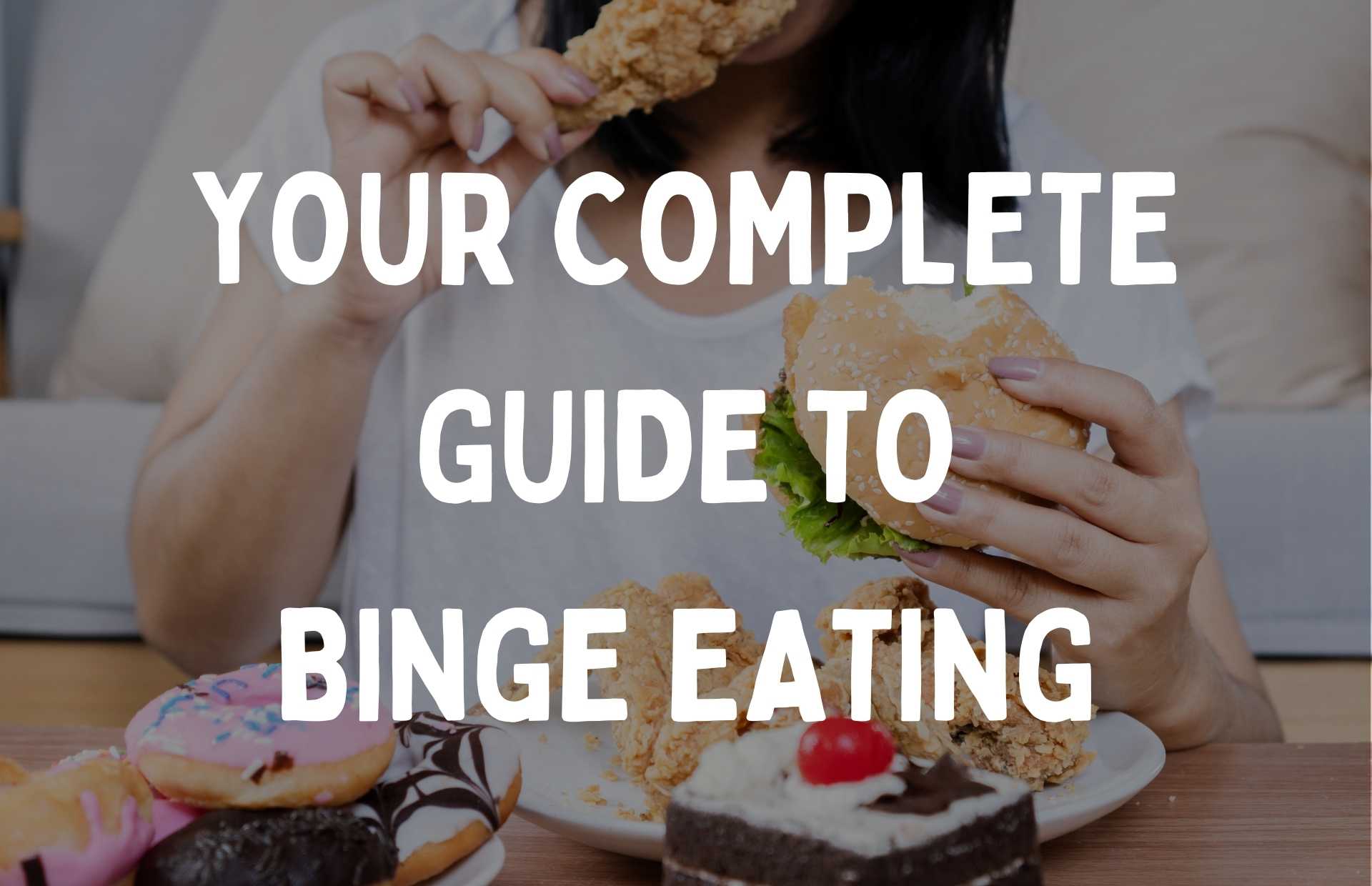

A Complete Guide to Binge Eating Disorder
Binge eating disorder (BED) is often misunderstood, and it?s more common than many people realise. If you've ever found yourself unable to stop eating, even when you're not hungry, or if you've felt ashamed after eating, you might be wondering if you?re dealing with something more serious than just the occasional overindulgence.
In this guide, we?ll take a closer look at what binge eating disorder is, its symptoms, causes, and most importantly, how to identify if you or someone you know might be struggling with it.
What is Binge Eating Disorder?
Binge Eating Disorder, or BED, is a psychological condition where individuals frequently consume large amounts of food in a short period while feeling a loss of control over their eating habits. It?s the most common eating disorder in the United States and can affect people of all genders, ages, and backgrounds. Unlike bulimia, binge eaters do not regularly purge after eating, which makes it different from other eating disorders.
BED was officially recognised as a medical condition in the Diagnostic and Statistical Manual of Mental Disorders (DSM-5) in 2013, and it affects millions of people worldwide.
Signs and Symptoms of Binge Eating Disorder
Recognising the symptoms of binge eating disorder is the first step toward understanding the severity of the condition. Here are some of the most common signs to look out for:
1. Eating Large Quantities of Food
People with BED tend to eat significantly more food in a short time compared to what most people would eat under similar circumstances. This often happens when they are not physically hungry.
2. Loss of Control
A key feature of BED is the feeling of being unable to stop eating, even when one is full or not hungry. This sense of loss of control is what separates BED from occasional overeating.
3. Eating Quickly
Those with BED often eat much more rapidly than usual, finishing meals in an unusually short amount of time.
4. Eating in Secret
Binge eaters may feel ashamed or embarrassed about the amount of food they are consuming, which can lead them to eat in isolation or hide food.
5. Feeling Distressed or Guilty Afterwards
After a binge, people with BED often feel disgusted, depressed, or guilty about their eating behaviour. This emotional response can worsen the binge eating cycle.

Causes and Risk Factors of Binge Eating Disorder
The exact cause of BED isn't fully understood, but research suggests that it is a combination of biological, psychological, and environmental factors.
1. Biological Factors
There may be a genetic component to BED. People who have a family history of eating disorders or mental health conditions may be more likely to develop BED themselves.
2. Psychological Factors
Mental health conditions like anxiety, depression, and low self-esteem are closely linked to binge eating disorder. People may use binge eating as a way to cope with overwhelming emotions or psychological distress.
3. Dieting and Food Restriction
Ironically, dieting or restricting food intake can increase the likelihood of binge eating. Strict diets often leave people feeling deprived, which can trigger binge eating episodes as the body tries to compensate.
4. Stress and Emotional Triggers
Stress is a major contributor to BED. Many people turn to food for comfort when they are stressed, sad, or bored. Emotional eating can become a habitual response to life?s challenges, leading to frequent bingeing.
Physical and Mental Health Consequences
Binge eating disorder can take a significant toll on both physical and mental health.
1. Obesity and Weight Gain
People with BED are more likely to struggle with obesity, as binge eating episodes often involve the consumption of high-calorie foods. This can lead to serious health issues such as heart disease, type 2 diabetes, and high blood pressure.
2. Gastrointestinal Issues
Frequent binge eating can cause stomach pain, bloating, and other digestive issues. It can also increase the risk of developing chronic conditions like acid reflux.
3. Mental Health Impact
The psychological toll of BED is just as severe as the physical effects. Many people with BED struggle with feelings of shame, guilt, anxiety, and depression. These emotional challenges can lead to social isolation and difficulty in maintaining relationships.

How to Know If You Have Binge Eating Disorder
If you suspect that you might have binge eating disorder, it?s essential to assess your eating habits and emotional responses to food.
1. Frequency of Binge Eating Episodes
Binge eating disorder is characterised by frequent binge eating episodes?usually at least once a week for three months or more. If you find yourself eating large quantities of food regularly and feeling out of control during these episodes, it may be a sign of BED.
2. Emotional Responses After Eating
Pay attention to how you feel after eating. Do you often feel guilt, shame, or regret after a meal? Are you using food as a way to cope with stress, sadness, or boredom? These emotional responses can be key indicators of binge eating disorder.
3. Impact on Your Daily Life
BED can affect various aspects of your life, from your physical health to your mental well-being and social relationships. If your eating habits are starting to negatively impact your quality of life, it may be time to seek professional help.
Diagnosis and Treatment of Binge Eating Disorder
1. Professional Diagnosis
If you think you might have BED, it's crucial to seek a professional diagnosis. Healthcare providers, including doctors, psychologists, and dietitians, can assess your symptoms, eating habits, and emotional state to determine whether you meet the criteria for binge eating disorder.
2. Cognitive Behavioral Therapy (CBT)
Cognitive behavioral therapy is one of the most effective treatments for BED. It helps individuals change negative thought patterns and behaviours around food, enabling them to manage their emotions and break the binge eating cycle.
3. Medication
In some cases, medication may be prescribed to help manage symptoms of BED, particularly if co-occurring conditions like depression or anxiety are present.
4. Self-Help Strategies
Mindful eating, stress management, and building a support system are critical components of managing binge eating disorder. Simple practices like paying attention to hunger cues and finding alternative coping mechanisms can go a long way in reducing the frequency of binge eating episodes.
5. See A Nutritionist Or Dietician
We'd strongly recommend seeing a qualified nutritionist or dietician if you struggle with binge eating ? in particular, one who specialises in eating disorders. At The Undiet Company, that's exactly what we do. We've helped hundreds of women to completely stop binge eating and take back control over food.
Tips for Preventing Binge Eating Disorder
1. Maintain a Balanced Diet
Avoid restrictive dieting, which can increase the likelihood of binge eating. Instead, focus on balanced, nutritious meals that provide your body with the energy and nutrients it needs.
2. Manage Stress Effectively
Developing healthy coping mechanisms for stress, such as meditation, exercise, or talking to a friend, can prevent you from turning to food for emotional comfort.
3. Seek Support
Don?t hesitate to reach out to friends, family, or a healthcare professional if you think you might be struggling with binge eating disorder. Support is critical in preventing and managing BED.

How Binge Eating Disorder Differs from Other Eating Disorders
It?s important to understand how binge eating disorder (BED) differs from other eating disorders, as they can sometimes appear similar on the surface but are distinct in terms of behaviour and underlying issues.
1. Binge Eating Disorder vs. Bulimia Nervosa
While both binge eating disorder and bulimia involve episodes of overeating, the key difference is how individuals respond afterwards. In bulimia nervosa, individuals typically engage in compensatory behaviours such as vomiting, using laxatives, or excessive exercise to ?undo? the effects of binge eating. People with binge eating disorder do not regularly attempt to compensate for their overeating, which can lead to significant weight gain over time.
2. Binge Eating Disorder vs. Anorexia Nervosa
Anorexia nervosa is characterised by extreme food restriction, fear of weight gain, and a distorted body image. Those with anorexia often eat very little, which contrasts sharply with the behaviour of binge eating disorder, where individuals consume large amounts of food in a short time. Although both disorders involve unhealthy relationships with food, the behaviours and mentalities surrounding food intake are polar opposites.
3. Binge Eating Disorder vs. Emotional Eating
Emotional eating is a common behaviour where people eat in response to feelings such as stress, boredom, or sadness. While emotional eating can lead to overeating occasionally, it does not meet the diagnostic criteria of binge eating disorder, which is characterised by recurring and severe episodes of binge eating along with emotional distress.
Misconceptions About Binge Eating Disorder
There are several myths and misconceptions about binge eating disorder that can prevent people from seeking the help they need. Let?s debunk some of the most common ones:
1. Myth: Binge Eating Disorder is Just Overeating
Many people assume that binge eating disorder is simply overeating, but the reality is far more complex. BED is a recognised mental health condition where individuals experience loss of control over their eating and often feel deep shame and distress afterwards. It?s not just about eating too much at a party or on a holiday.
2. Myth: Only Overweight People Struggle with Binge Eating
While many individuals with BED do struggle with their weight, it?s a misconception that only overweight people suffer from the disorder. People of any weight, size, or body type can be affected by binge eating disorder.
3. Myth: It?s Just a Lack of Willpower
BED is not about willpower. Like other mental health conditions, it has psychological, emotional, and biological underpinnings. Those affected by binge eating disorder often struggle with deep emotional pain and use food as a way to cope.
How to Support Someone with Binge Eating Disorder
If you have a loved one who is struggling with binge eating disorder, it can be difficult to know how to help. Here are a few practical steps you can take:
1. Encourage Professional Help
Encouraging your loved one to seek professional help from a doctor, therapist, or dietitian is one of the most supportive actions you can take. Binge eating disorder is treatable, but it often requires professional intervention.
2. Avoid Criticising or Blaming
Avoid making negative comments about their eating habits or body size. Criticism or blame can worsen feelings of shame and guilt, which may lead to more frequent binge eating episodes.
3. Be a Listening Ear
Sometimes the best support you can offer is just being there to listen without judgment. Encourage open communication and let them know they can talk to you about their struggles when they?re ready.
4. Focus on Non-Food-Related Activities
Instead of centring your time together around meals or food, try to focus on activities that aren?t related to eating. Go for a walk, enjoy a hobby, or engage in something fun and creative to help distract from thoughts of food.

Recovery and Long-Term Management
Recovery from binge eating disorder is a gradual process and looks different for everyone. With the right support and treatment, many people can overcome their binge eating behaviours and develop a healthier relationship with food.
1. Developing Healthy Coping Mechanisms
One of the main goals in treatment is to help individuals develop healthier ways to cope with stress, anxiety, and other emotional triggers that may lead to binge eating. This might include practices such as mindfulness, journaling, or seeking support from a therapist.
2. Building a Balanced Relationship with Food
Recovery also involves learning to eat in a balanced and mindful way. Many people in recovery from BED find it helpful to work with a nutritionist or dietitian.
3. Ongoing Support
Long-term recovery often requires ongoing support from professionals, family, and friends. Joining a support group, whether in person or online, can also be a valuable part of the recovery process, helping individuals stay on track and feel less isolated in their struggles.
4. The Undiet Program
The Undiet Program is our favourite way to help women stop binge eating and gain complete control over food. It's a 12 week program that involves working closely with a qualified nutritionist or dietician, whilst also being part of a supportive community of women who are on the same journey. The program even has a money-back guarantee, so you'll either completely stop binge eating or you don't pay.
Final Thoughts on Binge Eating Disorder
Binge eating disorder is a serious but treatable condition. Understanding the signs and symptoms, seeking professional help, and building a strong support network are crucial steps towards recovery. If you think you might be struggling with binge eating disorder, know that you?re not alone, and help is available.